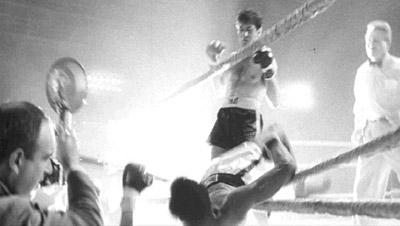



The violence in Raging Bull is ghastly and overdone. A nose
crunches, broken for us to hear close up; copious amounts of blood gush
out of orifices and gashes, drenching the ringside swells. To what
purpose? There are, it seems to me, three possible motives for such
displays of brutality. First, the obvious one: to exploit the worst in
boxing and in us. Second, the reverse: to expose this barbaric exercise,
drum up the reformers and hasten its abolition from the 20th century. Or
third: as a dramatic device to inform us about the characters.
 Alas, in Raging Bull, the spectacle of exaggerated violence is
put to no use whatsoever. It is introduced in the same way the director of
a skin flick every so often tosses in another bedroom adventure just
because it's a skin flick. To me, that is asexual, just as Raging Bull
is, ultimately, a-athletic, and amoral as well. This is the story of a
boxer, Jake LaMotta -- but what is he to boxing or boxing to him? About
all the film tells us about LaMotta the middleweight is that, given his
druthers, he would rather not give up sex and food before a fight. LaMotta
might just as well be a bus driver.
Alas, in Raging Bull, the spectacle of exaggerated violence is
put to no use whatsoever. It is introduced in the same way the director of
a skin flick every so often tosses in another bedroom adventure just
because it's a skin flick. To me, that is asexual, just as Raging Bull
is, ultimately, a-athletic, and amoral as well. This is the story of a
boxer, Jake LaMotta -- but what is he to boxing or boxing to him? About
all the film tells us about LaMotta the middleweight is that, given his
druthers, he would rather not give up sex and food before a fight. LaMotta
might just as well be a bus driver.
As a man, he is revealed as scum. No one ever disputes this, including
LaMotta himself, who served as technical adviser for the film. But then,
none of the characters around him possesses redeeming qualities, either.
As a consequence, nothing changes and the film -- like a lopsided fight --
could be stopped at any point without altering the outcome.
Yet what an extraordinary piece of work is Raging Bull. Has any
movie so utterly lacked soul and yet been so rewarding? The texture of the
script (by Paul Schrader and Mardik Martin) is never creased. The language
is so uncannily correct that no matter how filthy the dialogue, it's never
profane in spirit.
The music -- often dreamy, classical works played during the most
brutal ring action -- is elegantly jarring. The photography is black and
white. There are camera tactics that toy with affectation; yet never do
they cross the line. The dress -- especially that of the men -- is
perfectly ugly, like the language. It is as if someone from wardrobe went
to exactly the right hand-me-down shop to get a bunch of the clothes that
Bronx Italians would have worn in the 1940s; everybody in the film dresses
just so, in character.
The acting is exquisite. Vickie LaMotta, the missus, portrayed by a
beautiful novice, Cathy Moriarty, is played so finely and effortlessly
that either she is an absolute natural or is taking Meryl Streep pills.
Joe Pesci, as LaMotta's brother Joey, is the single most appealing
character, semi-scum, always within himself. Best of all, in a smaller
role, is Nicholas Colasanto as the fixer. No actor has ever made so much
of that stock figure, the small-time hood.
One can indeed say: Robert DeNiro Is Jake LaMotta! A less masterful job
of acting might have obliged the director, Martin Scorsese, to make more
of the character's conflicts. The prime example: the heart of the film is
LaMotta's obsession that his gorgeous Vickie is cheating on him. He bores
us and aggravates us with this, at last makes us detest him. During the
same period, LaMotta is gypped out of his rightful shot at the
middleweight title; for almost a full decade he awaits his fair due. But,
unaccountably, references to this chance to build up sympathy for a
wronged man and perhaps account for his domestic paranoia is lost.
Why Scorsese wanted to saddle himself with a film portraying a
despicable human is all the more baffling because the director's other
instincts are so correct. Scorsese's touches are everywhere. What this man
does with kitchens! There was an America that existed in kitchens, that
dealt with life from out of kitchens. Scorsese has that down pat, and he
doesn't need authentic costumes and oldies-but-goodies playing in the
background to pull it off. He also has grasped the precise pecking order
of that world: how people confronted one another, how they talked, when
they backed off, where they stood.
It is no mean accomplishment to capture interrelationships of a lost
subculture, but unfortunately, Jake the person never gets off the dime. So
while Scorsese's film is an achievement, it could've been much more.
Understand, Raging Bull doesn't lose. It just never gets the shot
it deserves at the champeenship. It remains a glorious contender.

